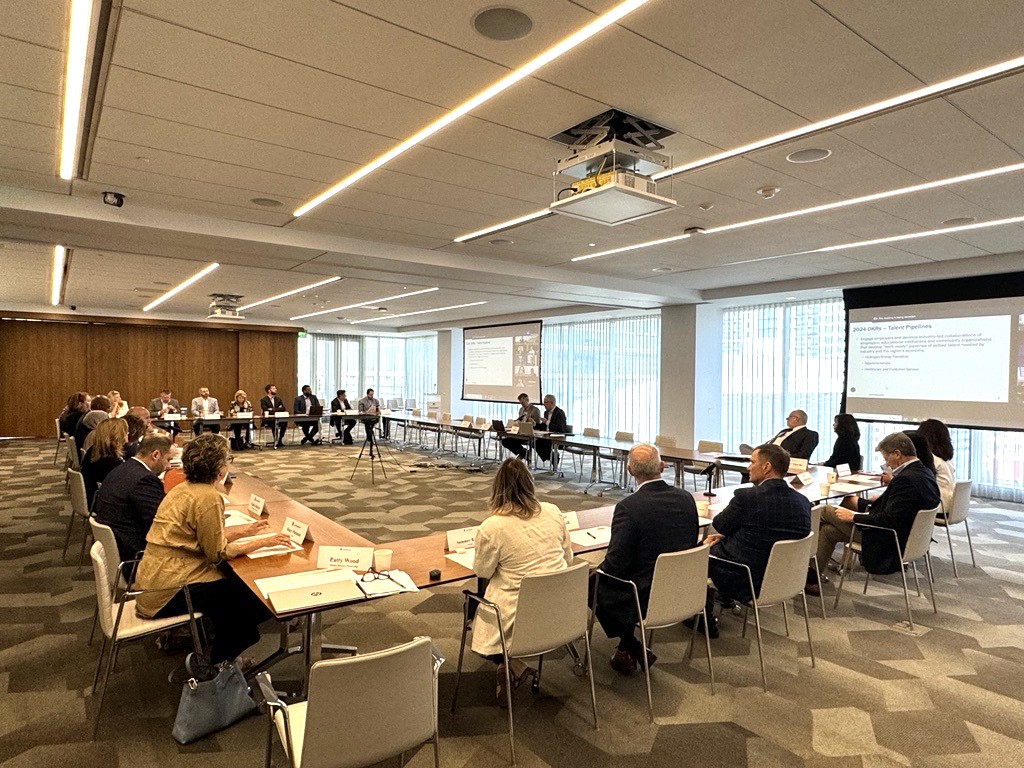Transforming Talent Pipelines: How UpSkill Houston is Pioneering Skills-Based Practices
Published Jul 22, 2024 by Peter Beard
A Letter from Peter Beard, Sr. Vice President, Regional Workforce:
Over the last 10 years, I have had the privilege to lead the Greater Houston Partnership’s (the Partnership) UpSkill Houston initiative and work with the region’s business, education and community leaders in building strong talent pipelines to support Houston’s key industry sectors. Five years ago, we partnered with the Boston Consulting Group (BCG) and identified a strategic focus of moving to skills-based hiring and education. As our region recovers from the pandemic and continues to experience economic growth, we have a unique opportunity to unite and ensure that skills-based practices enhance economic mobility and prosperity for our residents.
We have several key ingredients essential for adopting and implementing skills-based practices. Our collaboration with the Burning Glass Institute (BGI) has resulted in employer-developed skills matrices focusing on "work-ready" skills—those needed for success from day one. This initiative has also identified skills that can be developed on the job or through continued education while working. Additionally, the Greater Houston Apprentice Network, powered by Accenture and Aon, is helping employers build skills-based talent pipelines through apprenticeships. Recently, Accenture achieved its goal of hiring 20% of its entry-level professional workforce through this apprenticeship pipeline. Furthermore, outstanding programs like GenesysWorks and Capital IDEA are preparing individuals to be "work-ready" for the high-quality jobs in Houston’s regional economy.
While these key ingredients are essential, they are not yet sufficient to meet employers' demand for skilled talent or to establish Greater Houston as a “skills-first region.” Achieving this goal requires strong leadership and a shift in mindset to adopt and implement skills-based practices, especially as the workplace undergoes rapid digital transformation with new technologies such as automation, cloud applications, and artificial intelligence. Effective leadership is crucial to drive the significant changes needed to prioritize “work-ready” skills by:
- Rethinking entry-level job and hiring requirements.
- Clearly communicating “work-ready” skills and proficiency levels.
- Innovating educational approaches to adapt curricula that develop “work-ready” skills.
- Committing to hiring based on skills and experience.
Driving this change requires new mindsets across the region’s business, industry, education and community sectors. We need to cultivate agility in our key systems and processes to adapt to the accelerating digital disruption by:
- Encouraging leaders to move beyond traditional approaches to hiring and education.
- Providing support to front-line managers taking risks to hire work-ready entry-level talent that may need further skills development.
- Providing ongoing professional development to support growth into new roles.
Imagine a Houston where individuals graduate from K-12 schools, community colleges, or universities with the "work-ready" skills needed to succeed in the workplace. Envision a region where employers prioritize these skills over traditional credentials, offering opportunities for further development through on-the-job training or additional education while working. As digital disruption accelerates, the demand for on-the-job skills development will only grow, making this vision increasingly essential.
Join us in making Greater Houston a skills-first region. Together, we can build a thriving economy and create opportunities for all residents to succeed. Get involved with UpSkill Houston and help lead the way towards a more prosperous future.
 The Houston Report
The Houston Report




















